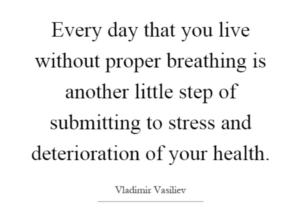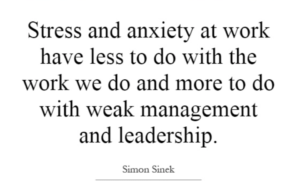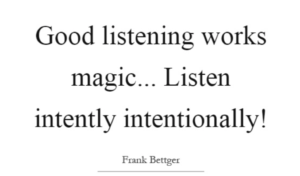
Hi guys and welcome to Stronger Thyngs!?
This content is here to give you an insight? into how we are making our business stronger every day and hopefully enable you to do the same.
Last week on Stronger Thyngs, we covered caring about your and maximising efficiency.
Today is Stress Awareness Day.
Because of this we've decided to create some content around how to manage stress. How to recognise stress in your teams and also how you can help to squash stress completely in your workplace?
So, if you’re prone to feeling the Herculean weight of stress or see the effects of this grim spectre in your workplace and are looking for another arrow in your quiver, read on ahead… Or, if you prefer video, hop on over to our YouTube channel to watch this content here?
Stress can impact people in different ways
Stress and anxiety are issues that are really close to my heart. It's something that all of us have dealt with in one way or another.
There's the physical response to stress…
Now the physical response to stress and anxiety is actually our body's protection from way back in the caveman days. If you read into what is happening and why it's happening, all of the things that your body is doing when you're feeling stressed is to protect itself from predators.
But we don't live in that world anymore.
We don't have the need to protect ourselves from a dinosaur running at us? thank God, because I'm not very good at running but we do still have those stresses in our life.
So,how do we combat them?
How do you know when you're getting stressed?
- Does your heart rate rise?
- Are your muscles getting tense?
- Are you starting to sweat?
Sweating during stress is actually so that you're more slippery and couldn't be caught – fun fact!
These signals are our body's way of saying, "Hi, not feeling so great over here!” and we need to listen to them!
It's so simple to combat these things as long as we catch them early enough and recognise what's going on.
Time for Action
Breathing is one of the most amazing ways that I and millions of other people use to deal with stress.
Now, people think, "Yep, breathing, I do that every day thanks. I've done it since I was born” - but have you actually?
Properly, we mean.
Have you ever seen a baby when it's breathing? Do you notice the way its whole stomach will rise up and sink when it's taking its first breaths?
This is because our bodies are completely ready to breathe when we’re born, and they understand that to maximise all of the goodness that we're breathing in they need to expand.
As we get older, we get lazy.
- Our breaths get shallower.
- We breathe from our chest and when you're stressed this becomes more and more apparent.
"If you're taking short sharp breaths, this is where you lead on to a panic attack or you go dizzy because you're not taking in enough oxygen to calm yourself down."
Now, being loud and being me, I am a singer...ish. My kids don't think so, but one thing that I am lucky enough to understand is how to breathe.
I know that if I'm stressed in a situation, I can…
- Take myself out of that situation
- Make sure my feet are firmly on the ground
- ...and just breathe, feeling every part of your body that that breath touches. Feeling it when it hits the back of your throat, travels down, and feeling your diaphragm expand.
If your diaphragm is not expanding, you're not really doing it right.
Yes! There's a reason why you're always told in a panicky situation to breathe in through your nose?
"Breathing in through your nose forces your body to practice diaphragmatic breathing. It forces your ribs to expand."
If you can breathe in for a count of four through your nose and then breathe it out for eight through your mouth, this is giving your body the chance to calm down.
This is my best technique?

I have two children.
Children are stressful and annoying sometimes?
On a Tuesday my children come into the office with me after school. Sometimes it's lovely, they all sit down and play. Sometimes they don't.
For me, I need a way that I can just whoosah before I lose my sh*t.And this is where breathing helps me.
But it's not just about the children or what your workload is, stress really can impact people in so many different ways and if you're not recognising that as an employer or even just as a member of a team then you're doing a disservice to your teammates.

Strong teams know each other
They are all completely different.
They have different skill sets, different abilities, different strengths and different weaknesses - but by knowing each other, they also recognise when something's wrong?
- Is it a change of behaviour?
- Is someone not bringing their ideas to the table anymore?
- Is someone crumbling under a workload?
- Are we skipping lunch because we just feel like we don’t have enough hours in the day to get everything done?
It's up to everyone.
"It's everyone's responsibility to recognise the signals, because if we're not recognising it then we're not helping."
And if we're not helping then we're going back to the things we were discussing in the last video (click here to watch on YouTube) around that conveyor belt of people just coming in and through your business.
Because it doesn't matter if that person over here is missing points X Y & Z - we didn't try and help them because we didn't notice that something wasn't right. We didn't do our duty as employers to make them the best that they can be?
What can I do for my staff?
So, you've noticed someone in your team, it might be your peer it might even be your manager, isn't behaving the way they normally would. There are changes, there's something going on…?
How do you address that?
Now, mental health is spoken about so much right now and that's fantastic. It's fantastic that people are talking, but is it becoming just noise?
Who is actually listening?!
Everyone is talking about things but is everybody listening?
It's so important that you let that person know that they can talk. They might not want to, but just knowing that someone's there is so important. So, if you are going to have a discussion with someone;
- Don't do it on the floor?
- Don't call them out?
- Take them out for a coffee
- Ask them for a catchup
- Ask them for help with a project
- Take them somewhere where they can feel comfortable and they can be open and honest
Although people might not always want to open up to you, if you're doing everything right as a manager, they should feel safe to talk to you.

So how do I listen?
Listening is such an important skill for anyone in business to have. It's important when you're talking to clients and it's mega important when you're talking to your staff.
When you're listening to someone, you really need to be taking in what they're saying.
We all learn active listening for any customer service role. Everyone sits through the course and understands, or is talked at, about emotional intelligence, active listening, and listening signals.
But how much of those people really take that on and take that forward with them?
Because it's not just important for our customers, it's important when you're having a conversation with anyone.
It's all too easy to just agree,
"Yes, yes…”?
and try and get to the point that you're trying to get to you in your head, because we're busy.
We're all busy. We're on our phones, we're at work, we're doing what feels like EVERYTHING.
This 'time' has to be within a safe space - where you're not being distracted by anything?- and you're really trying to understand what that person is saying to you.
You might not be able to solve anyone's problems. But if you're listening to them then you're allowing them to speak up about whatever it is that's causing them problems. Getting it out of their system & out of the danger of silent suffering.
And who knows, you might even have some great advice… you can at least teach them how to breathe really well. No excuses after this article!

There are so many different things out there
to support people.
People use mindfulness, meditation... I grow plants.
I have a lot of plants?
If I do feel stressed, I just go into my little room where my plants are, breathe, talk to my plants a bit, and then I feel a lot better.
Everyone is different, but if you can learn some of the coping mechanisms and listen to what your staff are saying then you can have an impact on stress in your workplace.
Helping your staff manage stress and helping your team manage their own stresses is just one of the ways that you can really work to building and maintaining a stress-free workplace for you and your team.
Let's not forget... managing your own stress has a strong impact on everyone else's stress around you. It's almost contagious! Look after yourself, too. You hear me? Good. Want more tips to help yourself & others cope with stress? This might help.
What are you waiting for?
Send out an email to your colleagues or employees, friends and family, and spread #StressAwarenessDay, share this article around
...learn to deal with your own stress & have it inspire others! Check up on others & ask yourself "Am I OK? Am I coping?" and take what we said into practice.
Thank you so much for your time. If you have found any of this helpful or you like what we're saying please don't hesitate to reach out, let us know what you think, how this content has helped you or what else you’d love us to talk about.
I'm Laura Fox-Newby, and we’re Thyngs.



